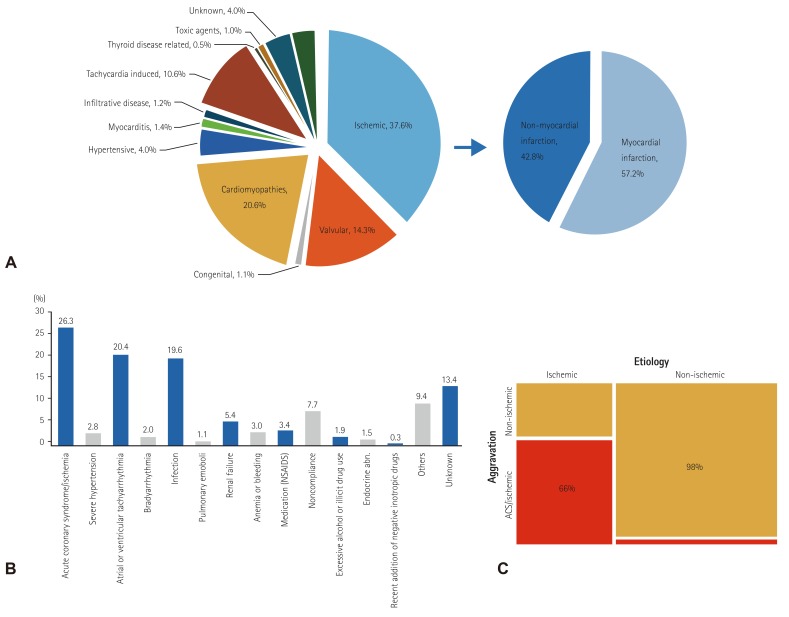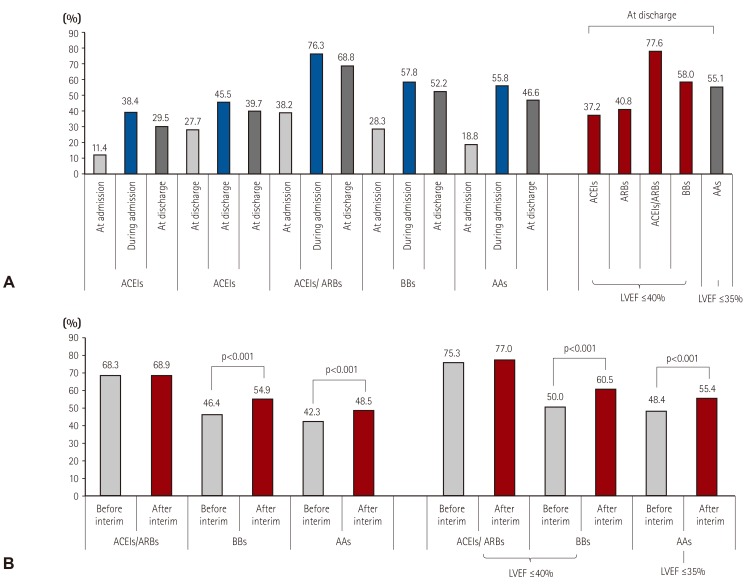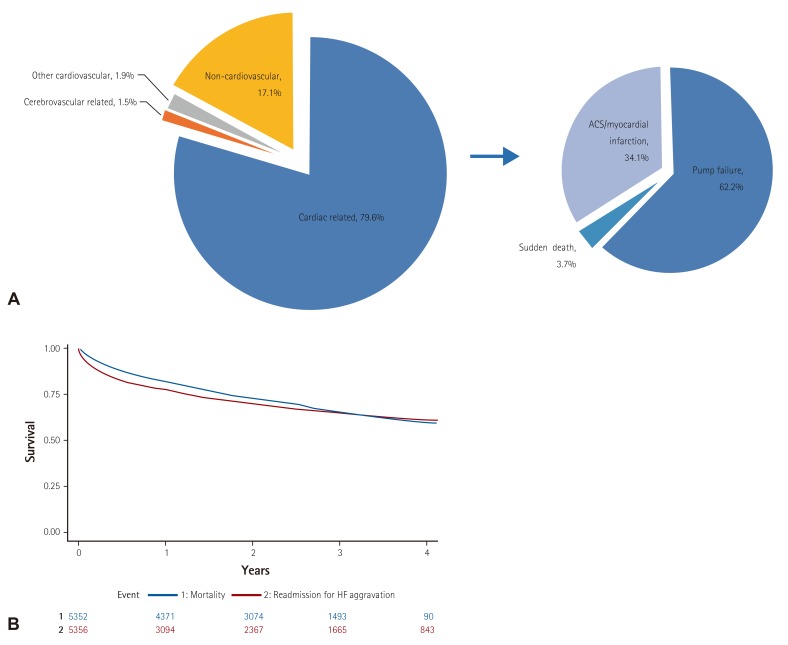Clinical Characteristics and Outcome of Acute Heart Failure in Korea: Results from the Korean Acute Heart Failure Registry (KorAHF)
- Affiliations
-
- 1Department of Internal Medicine, Seoul National University Hospital, Seoul, Korea. hylee612@snu.ac.kr
- 2Department of Internal Medicine, Sungkyunkwan University College of Medicine, Seoul, Korea.
- 3Department of Internal Medicine, Asan Medical Center, University of Ulsan College of Medicine, Seoul, Korea.
- 4Department of Internal Medicine, Chungbuk National University College of Medicine, Cheongju, Korea.
- 5Department of Internal Medicine, Kyungpook National University College of Medicine, Daegu, Korea.
- 6Department of Internal Medicine, College of Medicine, The Catholic University of Korea, Seoul, Korea.
- 7Department of Internal Medicine, Yonsei University College of Medicine, Seoul, Korea.
- 8Department of Internal Medicine, Seoul National University Bundang Hospital, Seongnam, Korea.
- 9Department of Internal Medicine, Yonsei University Wonju College of Medicine, Wonju, Korea.
- 10Department of Internal Medicine, Heart Research Center of Chonnam National University, Gwangju, Korea.
- 11Division of Cardiovascular and Rare Diseases, Korea National Institute of Health, Cheongju, Korea.
- KMID: 2385388
- DOI: http://doi.org/10.4070/kcj.2016.0419
Abstract
- BACKGROUND AND OBJECTIVES
The burden of heart failure has increased in Korea. This registry aims to evaluate demographics, clinical characteristics, management, and long-term outcomes in patients hospitalized for acute heart failure (AHF).
SUBJECTS AND METHODS
We prospectively enrolled a total of 5625 consecutive subjects hospitalized for AHF in one of 10 tertiary university hospitals from March 2011 to February 2014. Descriptive statistics were used to determine the baseline characteristics of the study population and to compare them with those from other registries.
RESULTS
The mean age was 68.5±14.5 years, 53.2% were male, and 52.2% had de novo heart failure. The mean systolic and diastolic blood pressures were 131.2±30.3 mmHg and 78.6±18.8 mmHg at admission, respectively. The left ventricular ejection fraction was ≤40% in 60.5% of patients. Ischemia was the most frequent etiology (37.6%) and aggravating factor (26.3%). Angiotensin converting enzyme inhibitors/angiotensin receptor blockers, beta-blockers, and aldosterone antagonists were prescribed in 68.8%, 52.2%, and 46.6% of the patients at discharge, respectively. Compared with the previous registry performed in Korea a decade ago, extracorporeal membrane oxygenation (ECMO) and heart transplantation have been performed more frequently (ECMO 0.8% vs. 2.8%, heart transplantation 0.3% vs. 1.2%), and in-hospital mortality decreased from 7.6% to 4.8%. However, the total cost of hospital care increased by 40%, and one-year follow-up mortality remained high.
CONCLUSION
While the quality of acute clinical care and AHF-related outcomes have improved over the last decade, the long-term prognosis of heart failure is still poor in Korea. Therefore, additional research is needed to improve long-term outcomes and implement cost-effective care.
Keyword
MeSH Terms
-
Demography
Extracorporeal Membrane Oxygenation
Follow-Up Studies
Guideline Adherence
Heart Failure*
Heart Transplantation
Heart*
Hospital Mortality
Hospitals, University
Humans
Ischemia
Korea*
Male
Mineralocorticoid Receptor Antagonists
Mortality
Peptidyl-Dipeptidase A
Prognosis
Prospective Studies
Quality of Health Care
Registries
Stroke Volume
Treatment Outcome
Mineralocorticoid Receptor Antagonists
Peptidyl-Dipeptidase A
Figure
Cited by 10 articles
-
Updates of Cardiovascular Manifestations in COVID-19: Korean Experience to Broaden Worldwide Perspectives
In-Cheol Kim, Hyun Ah Kim, Jae Seok Park, Chang-Wook Nam
Korean Circ J. 2020;50(7):543-554. doi: 10.4070/kcj.2020.0205.Implantable Cardioverter-defibrillator Utilization and Its Outcomes in Korea: Data from Korean Acute Heart Failure Registry
Youngjin Cho, Sang-Yeong Cho, Il-Young Oh, Ji Hyun Lee, Jin Joo Park, Hae-Young Lee, Kye Hun Kim, Byung-Su Yoo, Seok-Min Kang, Sang Hong Baek, Eun-Seok Jeon, Jae-Joong Kim, Myeong-Chan Cho, Shung Chull Chae, Byung-Hee Oh, Dong-Ju Choi
J Korean Med Sci. 2020;35(46):e397. doi: 10.3346/jkms.2020.35.e397.Epidemiology, Pathophysiology, Diagnosis and Treatment of Heart Failure in Diabetes
Jin Joo Park
Diabetes Metab J. 2021;45(2):146-157. doi: 10.4093/dmj.2020.0282.Prognostic Significance of Left Axis Deviation in Acute Heart Failure Patients with Left Bundle branch block: an Analysis from the Korean Acute Heart Failure (KorAHF) Registry
Ki Hong Choi, Seongwook Han, Ga Yeon Lee, Jin-Oh Choi, Eun-Seok Jeon, Hae-Young Lee, Sang Eun Lee, Jae-Joong Kim, Shung Chull Chae, Sang Hong Baek, Seok-Min Kang, Dong-Ju Choi, Byung-Su Yoo, Kye Hun Kim, Myeong-Chan Cho, Hyun-Young Park, Byung-Hee Oh
Korean Circ J. 2018;48(11):1002-1011. doi: 10.4070/kcj.2018.0048.Prognostic impact of chromogranin A in patients with acute heart failure
Hong Nyun Kim, Dong Heon Yang, Bo Eun Park, Yoon Jung Park, Hyeon Jeong Kim, Se Yong Jang, Myung Hwan Bae, Jang Hoon Lee, Hun Sik Park, Yongkeun Cho, Shung Chull Chae
Yeungnam Univ J Med. 2021;38(4):337-343. doi: 10.12701/yujm.2020.00843.Update on the Pharmacotherapy of Heart Failure with Reduced Ejection Fraction
Eui-Soon Kim, Jong-Chan Youn, Sang Hong Baek
Cardiovasc Prev Pharmacother. 2020;2(4):113-133. doi: 10.36011/cpp.2020.2.e17.Korean Society of Heart Failure Guidelines for the Management of Heart Failure: Definition and Diagnosis
Jae Yeong Cho, Dong-Hyuk Cho, Jong-Chan Youn, Darae Kim, Sang Min Park, Mi-Hyang Jung, Junho Hyun, Jimi Choi, Hyun-Jai Cho, Seong-Mi Park, Jin-Oh Choi, Wook-Jin Chung, Byung-Su Yoo, Seok-Min Kang,
Korean Circ J. 2023;53(4):195-216. doi: 10.4070/kcj.2023.0046.Iron Deficiency in Korean Patients With Heart Failure
Jin Joo Park, Minjae Yoon, Hyoung-Won Cho, Sang-Eun Lee, Jin-Oh Choi, Byung-Su Yoo, Seok-Min Kang, Dong-Ju Choi
J Korean Med Sci. 2023;38(23):e177. doi: 10.3346/jkms.2023.38.e177.Korean Society of Heart Failure Guidelines for the Management of Heart Failure: Management of the Underlying Etiologies and Comorbidities of Heart Failure
Sang Min Park, Soo Youn Lee, Mi-Hyang Jung, Jong-Chan Youn, Darae Kim, Jae Yeong Cho, Dong-Hyuk Cho, Junho Hyun, Hyun-Jai Cho, Seong-Mi Park, Jin-Oh Choi, Wook-Jin Chung, Seok-Min Kang, Byung-Su Yoo,
Korean Circ J. 2023;53(7):425-451. doi: 10.4070/kcj.2023.0114.Korean Society of Heart Failure Guidelines for the Management of Heart Failure: Advanced and Acute Heart Failure
Junho Hyun, Jae Yeong Cho, Jong-Chan Youn, Darae Kim, Dong-Hyuk Cho, Sang Min Park, Mi-Hyang Jung, Hyun-Jai Cho, Seong-Mi Park, Jin-Oh Choi, Wook-Jin Chung, Byung-Su Yoo, Seok-Min Kang,
Korean Circ J. 2023;53(7):452-471. doi: 10.4070/kcj.2023.0115.
Reference
-
1. Bui AL, Horwich TB, Fonarow GC. Epidemiology and risk profile of heart failure. Nat Rev Cardiol. 2011; 8:30–41. PMID: 21060326.2. Ambrosy AP, Fonarow GC, Butler J, et al. The global health and economic burden of hospitalizations for heart failure: lessons learned from hospitalized heart failure registries. J Am Coll Cardiol. 2014; 63:1123–1133. PMID: 24491689.3. Heidenreich PA, Trogdon JG, Khavjou OA, et al. Forecasting the future of cardiovascular disease in the United States: a policy statement from the American Heart Association. Circulation. 2011; 123:933–944. PMID: 21262990.4. Okura Y, Ramadan MM, Ohno Y, et al. Impending epidemic: future projection of heart failure in Japan to the year 2055. Circ J. 2008; 72:489–491. PMID: 18296852.5. Curtis LH, Whellan DJ, Hammill BG, et al. Incidence and prevalence of heart failure in elderly persons, 1994-2003. Arch Intern Med. 2008; 168:418–424. PMID: 18299498.6. Sato N, Kajimoto K, Asai K, et al. Acute decompensated heart failure syndromes (ATTEND) registry. A prospective observational multicenter cohort study: rationale, design, and preliminary data. Am Heart J. 2010; 159:949–955.e1. PMID: 20569705.7. Fonarow GC, Heywood JT, Heidenreich PA, Lopatin M, Yancy CW. ADHERE Scientific Advisory Committee and Investigators. Temporal trends in clinical characteristics, treatments, and outcomes for heart failure hospitalizations, 2002 to 2004: findings from Acute Decompensated Heart Failure National Registry (ADHERE). Am Heart J. 2007; 153:1021–1028. PMID: 17540205.8. Abraham WT, Fonarow GC, Albert NM, et al. Predictors of in-hospital mortality in patients hospitalized for heart failure: insights from the Organized Program to Initiate Lifesaving Treatment in Hospitalized Patients with Heart Failure (OPTIMIZE-HF). J Am Coll Cardiol. 2008; 52:347–356. PMID: 18652942.9. Nieminen MS, Brutsaert D, Dickstein K, et al. EuroHeart Failure Survey II (EHFS II): a survey on hospitalized acute heart failure patients: description of population. Eur Heart J. 2006; 27:2725–2736. PMID: 17000631.10. West R, Liang L, Fonarow GC, et al. Characterization of heart failure patients with preserved ejection fraction: a comparison between ADHERE-US registry and ADHERE-International registry. Eur J Heart Fail. 2011; 13:945–952. PMID: 21712289.11. Choi DJ, Han S, Jeon ES, et al. Characteristics, outcomes and predictors of long-term mortality for patients hospitalized for acute heart failure: a report from the korean heart failure registry. Korean Circ J. 2011; 41:363–371. PMID: 21860637.12. Francis GS, Cogswell R, Thenappan T. The heterogeneity of heart failure: will enhanced phenotyping be necessary for future clinical trial success? J Am Coll Cardiol. 2014; 64:1775–1776. PMID: 25443697.13. Pitt B, Pfeffer MA, Assmann SF, et al. Spironolactone for heart failure with preserved ejection fraction. N Engl J Med. 2014; 370:1383–1392. PMID: 24716680.14. Kook HY, Jeong MH, Oh S, et al. Current trend of acute myocardial infarction in Korea (from the Korea Acute Myocardial Infarction Registry from 2006 to 2013). Am J Cardiol. 2014; 114:1817–1822. PMID: 25438907.15. Ha KH, Kim DJ. Trends in the diabetes epidemic in Korea. Endocrinol Metab (Seoul). 2015; 30:142–146. PMID: 26194073.16. Jhun HJ, Kim H, Cho SI. Time trend and age-period-cohort effects on acute myocardial infarction mortality in Korean adults from 1988 to 2007. J Korean Med Sci. 2011; 26:637–641. PMID: 21532854.17. Lee JH, Lim NK, Cho MC, Park HY. Epidemiology of heart failure in Korea: present and future. Korean Circ J. 2016; 46:658–664. PMID: 27721857.18. Service KNHI [Internet]. 2014. 9. cited 2016 October. Available from: http://www.nhis.or.kr/bbs7/boards/B0039/3171.19. Han SW, Ryu KH, Chae SC, et al. Multicenter analysis of clinical characteristics and prognostic factors of patients with congestive heart failure in Korea. Korean Circ J. 2005; 35:357–361.20. Lee SE, Cho HJ, Lee HY, et al. A multicentre cohort study of acute heart failure syndromes in Korea: rationale, design, and interim observations of the Korean Acute Heart Failure (KorAHF) registry. Eur J Heart Fail. 2014; 16:700–708. PMID: 24797348.21. Ponikowski P, Voors AA, Anker SD, et al. 2016 ESC guidelines for the diagnosis and treatment of acute and chronic heart failure: the task force for the diagnosis and treatment of acute and chronic heart failure of the European Society of Cardiology (ESC) developed with the special contribution of the Heart Failure Association (HFA) of the ESC. Eur Heart J. 2016; 37:2129–2200. PMID: 27206819.22. Adams KF Jr, Fonarow GC, Emerman CL, et al. Characteristics and outcomes of patients hospitalized for heart failure in the United States: rationale, design, and preliminary observations from the first 100,000 cases in the Acute Decompensated Heart Failure National Registry (ADHERE). Am Heart J. 2005; 149:209–216. PMID: 15846257.23. Harjola VP, Follath F, Nieminen MS, et al. Characteristics, outcomes, and predictors of mortality at 3 months and 1 year in patients hospitalized for acute heart failure. Eur J Heart Fail. 2010; 12:239–248. PMID: 20156940.24. Chioncel O, Vinereanu D, Datcu M, et al. The Romanian Acute Heart Failure Syndromes (RO-AHFS) registry. Am Heart J. 2011; 162:142–153.e1. PMID: 21742101.25. McCullough PA, Hassan SA, Pallekonda V, et al. Bundle branch block patterns, age, renal dysfunction, and heart failure mortality. Int J Cardiol. 2005; 102:303–308. PMID: 15982501.26. Farwell D, Patel NR, Hall A, Ralph S, Sulke AN. How many people with heart failure are appropriate for biventricular resynchronization? Eur Heart J. 2000; 21:1246–1250. PMID: 10924314.27. Maggioni AP, Anker SD, Dahlström U, et al. Are hospitalized or ambulatory patients with heart failure treated in accordance with European Society of Cardiology guidelines? Evidence from 12,440 patients of the ESC heart failure long-term registry. Eur J Heart Fail. 2013; 15:1173–1184. PMID: 23978433.28. Lee HY, Chung WJ, Jeon HK, et al. Impact of the β-1 adrenergic receptor polymorphism on tolerability and efficacy of bisoprolol therapy in Korean heart failure patients: association between β adrenergic receptor polymorphism and bisoprolol therapy in heart failure (ABBA) study. Korean J Intern Med. 2016; 31:277–287. PMID: 26879662.
- Full Text Links
- Actions
-
Cited
- CITED
-
- Close
- Share
- Similar articles
-
- Paradigm Shifts of Heart Failure Therapy: Do We Need Another Paradigm?
- How to tackle congestion in acute heart failure
- A Case of Acute Fulminant Myocarditis Progressed into and Recovered from Congestive Heart Failure and Multiorgan Failure
- Volume Status, a Novel Marker of Contrast Induced Acute Kidney Injury in Acute Heart Failure Undergoing Coronary Angiography?
- Temporal Trends of Hospitalized Patients with Heart Failure in Korea




